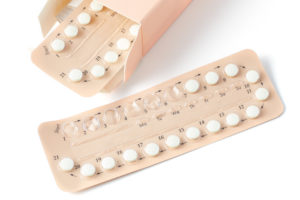Ladies, meet Dr. James A. Simon, a Washington, DC-based physician who treats women from adolescence through the menopause transition, and beyond, encouraging his patients to be part of their own wellness, disease prevention, treatment and recovery. An esteemed clinical researcher, Dr. Simon’s interests include clinical management of peri-and postmenopausal women, female sexual dysfunction, osteoporosis, contraception and reproductive endocrinology. He has served as principal investigator on over 300 clinical trials, research grants and scholarships in the area of women’s health, which enables him to offer his patients one-of-a-kind opportunities to experience the latest innovations in the field.

Former president of the North American Menopause Society (NAMS), Dr. Simon currently serves as president of the International Society for the Study of Women’s Sexual Health (ISSWSH). He is co-author of the 2001 book Restore Yourself: A Woman’s Guide to Reviving Her Sexual Desire and Passion for Life. Determined to advance the cause of women’s sexual health in the United States (“it’s a disaster,” he says), Dr. Simon won’t rest easy until he does.
I had the privilege to attend the ISSWSH annual meeting in Atlanta, GA, a few weeks ago, where Dr. Simon talked about “How US Governmental Agencies Inadvertently Conspire Against Women’s Sexual Health: A Personal Perspective.” Bear in mind, this is Dr. Simon’s “personal perspective, not a government or organizational perspective,” he emphasized.
If you’d like to make an appointment to see Dr. Simon or one of his colleagues, you can call INTIMMEDICINE Specialists at 202-293-1000.

MEDICARE CARES ABOUT MEN’S SEXUAL HEALTH, NOT SO MUCH ABOUT OURS
“About 60 million people receive Medicare benefits in the United States, which is about 18 percent of the entire population, yet up until December 31, 2018, women didn’t enjoy the same rights as men from the Centers for Medicare and Medicaid Services (CMS). While Medicare paid for penile implants for men with difficult-to-treat erectile dysfunction, it didn’t pay for medical treatment for menopausal women who experienced painful sex, although up to 75 percent of postmenopausal women report they find sex painful.

“When ED drugs such as Viagra don’t work on men who had prostate cancer, for example, penile implants can help them return to their old sex lives. The implants cost upwards of $30,000 without insurance. But women had to pay out of pocket to treat their painful sex. “If a woman chose to alleviate her pain, the CMS considered it a ‘lifestyle choice,’ which is just weird. Who do they think the men with penile implants were supposed to have sex with?
“So a large group of us lobbied the CMS and told them, ‘You can’t have older men with penile implants having sex with wives, girlfriends or intimate partners with significant pain. It’s just not fair.’ When they didn’t agree with us, we said ‘either you’re going to fix it or we’re going to go public.’ Fortunately, they fixed it, as if women didn’t have vaginas until then. Medicare now mandates that all secondary drug plans have some coverage for vulvar and vaginal atrophy (VVA) or Genitourinary Syndrome of Menopause for painful sex after menopause. They have to cover the class of meds that make an older woman’s vagina capable of having sex with her partner without pain.”
VAGINAS ARE VERBOTEN
“Now let’s talk about the FCC, the agency that controls what we hear on radio and what we see on TV.

Although the FCC says you CAN SAY the word ‘vagina’ or TV, it can’t be used to describe anything titillating or related to sex. Now, I know that the vagina is for birthing babies, but I also know it’s an organ to have sex, and hopefully pleasurable, not painful, sex. So how do you advertise a medical device or a medication that’s meant for improving the health of the vagina, especially the sexual health of the vagina, considering how the FCC restricts the use of the word?
“Imagine if a fireman couldn’t say the word ‘fire.’ Would he have to make a call to get his troops out by saying ‘there’s red hot flamy stuff everywhere’? It’s a little bit challenging for us. There’s a big gap between talking about the vagina as a sexual organ and talking about it as sexual organ that’s indecent, which is what the FCC is trying to avoid.
“This is why none of the products we prescribe for sexual pain are advertised on TV. Yet, there are plenty of women with vaginas.”
THE ABORTION ABERRATION
“The executive branch of the government recently called for new rules that will eliminate Title X funding for those agencies that provide health services to the poor and disadvantaged, in particular, Planned Parenthood.
 “The government doesn’t want to be seen as paying for abortion services, but all abortion services provided through Planned Parenthood are typically funded by private donations and grants, not by the government. Yet, if you make it difficult for poor and disadvantaged women to get contraception and other family planning services, you’re more likely to see unintended pregnancies. For this, I like to quote Dr. John Guillebaud, an emeritus professor of family planning from London, who said: ‘Most accidents are caused by humans and most humans are caused by accidents.’”
“The government doesn’t want to be seen as paying for abortion services, but all abortion services provided through Planned Parenthood are typically funded by private donations and grants, not by the government. Yet, if you make it difficult for poor and disadvantaged women to get contraception and other family planning services, you’re more likely to see unintended pregnancies. For this, I like to quote Dr. John Guillebaud, an emeritus professor of family planning from London, who said: ‘Most accidents are caused by humans and most humans are caused by accidents.’”
LORDY, THOSE DANG DRUG LABELS
“I have a lot of problems with the Food and Drug Administration (FDA) about a number of women’s health issues, but let’s talk about the labels that are required to be placed on low-dose vaginal estrogen products to treat women who have VVA, or painful sex.
“The labels must say that these products cause an increase in endometrial cancer, stroke and deep vein thrombosis, an increase in probable dementia, and an increase in breast cancer when used with a progesterone-like drug. Now, that sounds pretty terrible. Why would anybody who has painful sex exchange it for a heart attack, stroke, dementia, or breast cancer? It just doesn’t sound like a fair exchange. The problem is that none of those things is true.
 “The FDA originally came to this determination because some of the increased risks I just mentioned were found to be true in a Women’s Health Initiative government study from 1993 to 2005 where large numbers of women were getting systemic treatment like pills and patches with estrogen and progesterone. It subsequently came to light, however, that a branch of this study involving women taking low-dose estrogen, only in the vagina, for painful sex after menopause, had not experienced an increase in any of the risks.
“The FDA originally came to this determination because some of the increased risks I just mentioned were found to be true in a Women’s Health Initiative government study from 1993 to 2005 where large numbers of women were getting systemic treatment like pills and patches with estrogen and progesterone. It subsequently came to light, however, that a branch of this study involving women taking low-dose estrogen, only in the vagina, for painful sex after menopause, had not experienced an increase in any of the risks.
“Despite the publication of this new information, the FDA still requires the warning label for low-dose vaginal estrogen products, including on a product that was recently introduced.
“The experts from the NAMS and ISSWSH filed a citizen’s petition in 2015 to have that labeling requirement changed, but in mid-2018 the FDA said they’re not changing it.”
THE IRS GETS INTO THE ACT
 “No one likes the taxman, whether the IRS or the state tax assessor in the first place. But what would you say if I told you that the IRS or most states are hurting women’s sexual health? You’d probably say, ‘Come on, Dr. Simon.’ Well, they are hurting women’s sexual health because our government taxes Tampons and other sanitary products. Only 10 states don’t have the tax, including Nevada, Wisconsin, Illinois, Florida and a bunch of states in The Northeast.
“No one likes the taxman, whether the IRS or the state tax assessor in the first place. But what would you say if I told you that the IRS or most states are hurting women’s sexual health? You’d probably say, ‘Come on, Dr. Simon.’ Well, they are hurting women’s sexual health because our government taxes Tampons and other sanitary products. Only 10 states don’t have the tax, including Nevada, Wisconsin, Illinois, Florida and a bunch of states in The Northeast.
“I do a lot of research on women with heavy menstrual bleeding. Many of them can’t even be employed because they aren’t able to leave the house for one week a month, when they’re bleeding so heavily. And many of these are poor or African American women, or both, who have uterine fibroid tumors.
“Canada removed this so called ‘tampon tax’ in 2015 and India removed its 12 percent tax in 2018. We still have it.”

